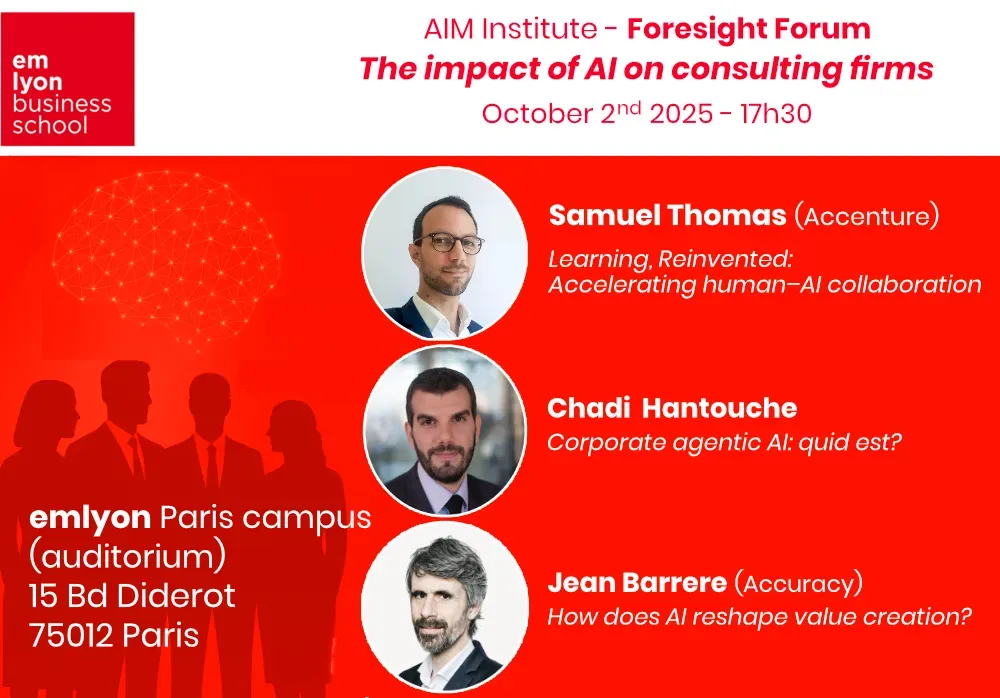News - AIM
February 10th 2026 - The Women in Data Science (WiDS) event is back in Paris
Created by Stanford University in 2015, this international initiative aims to promote and support women working in the fields of data science and AI. Now present in more than 150 countries, WiDS brings together thousands of students, professionals, and committed companies every year.
October 2nd 2025 - Foresight Forum
The AIM Institute is organizing the first edition of the « Foresight Forum » on impact of AI on the workplace. This session will be focused on consulting firms and jobs. We will be welcoming (and discussing):
- Samuel Thomas (Learning, reinvented: Accelerating human-AI collaboration)
- Chadi Hantouche (Corporate agents AI: quid est?)
- Jean Barrère (How does AI reshape value creation?)
The audience will mainly be students from emlyon’s thematic masters’ degrees (in data, AI and consulting).
Registration is also possible for external participants. Please register by 30 Sept. contact: robin@em-lyon.com

October 6, 2025 - Jacques Cartier Talks – AI: What Transformations for Organizations?
As part of the Jacques Cartier Talks 2025, we are pleased to organize an event on the emlyon campus dedicated to the transformations that artificial intelligence and data impose on organizations. These technologies are disrupting governance, transforming professions, questioning practices, and also opening up unprecedented opportunities.
Workshop
The AIM Workshop that took place on May 13th 2025 at emlyon business school explored how AI is transforming organizations, education, science, and work. Scholars presented research on the promises and complexities of integrating AI across sectors. Key insights included:
- Yingting Wen (emlyon): Compared generative AI and human-created marketing narratives, finding AI effective at conveying positive affect and influencing purchase intent, despite some limits in realism and diversity.
- Artyom Yepremyan (SKEMA): Showed that AI adoption reduces job specialization, increasing demand for generalist skills across U.S. firms.
- Alex Alekseev (Univ. Regensburg): Identified a "human premium"—a bias favoring humans over machines for task allocation, even when costs are equal.
- Sumayya Shaikh (GEM): Found that regulated use of generative AI in business schools boosts both ethical perceptions and support from stakeholders.
- Marina Chugunova (Max Planck Institute): Surveyed German researchers, revealing high AI use but limited prompting skills and concerns about legal clarity.
- Ali Zaher (Univ. Lyon III): Explored how attitudes, norms, and perceived control shape physician acceptance of AI in healthcare, emphasizing the role of curiosity and cultural context.
Women in Data Science (WiDS)!
emlyon business school was hosting the 2025 edition of WIDS on the 21st of March. The global movement launched by Stanford University and is this year organized by Imène Brigui, professor of AI and data science.
AI for Business
Our new Executive module « AI for Business » welcomes its first cohort in March.
Data Science Missions!
Our students in the MSc in Data Science & Artificial Intelligence Strategy are engaged early 2025 with companies to solve problems and/or improve productivity.
Topics include customer segmentation, obstacle prediction models (for vehicles), burnout prediction among healthcare workers, churn reduction for customer retention, and purchase behavior forecasting. The common denominator of all these projects is deep data analysis.
If your company wishes to participate in the next missions, please contact Imène Brigui (brigui@em-lyon.com)
New paper
Yingting Wen published « Experiential Narratives in Marketing: A Comparison of Generative AI and Human Content » in the Journal of Public Policy & Marketing.
This paper examines whether generative AI can create experiential narratives that resonate with humans in terms of embodied cognition, affect, and lexical diversity. It reveals LLMs’ strengths in presenting positive emotions and influencing purchase intent but also identifies limitations in embodied cognition and lexical diversity compared with human-authored content.
Seminars
- 28 April: Antonin Bergeaud, HEC Paris, "AI and the Future of Productivity"
- 2 April: Vincent Tena, Paris Dauphine University, "AI Adoption, Incentives, and Firm Value in General Equilibrium" (with Gilles Chemla)
- 26 February: Thomas Walther, Utrecht School of Economics, "Certainly! Generative AI and its Impact on Academic Writing (in Finance)"
- 18 December: Brian Jabarian, University of Chicago - Booth School of Business, "Voice AI in Firms: A Natural Field Experiment on Automated Job Interviews"
- 25 November: Tianxi Cai , Harvard Medical School, "From Clinic to Discovery: Advancing Health Innovation Through Better Use of EHRs"
- 11 February: Hao Yang, PhD Candidate in Finance at Swiss Finance Institute and USI Lugano, "Asset Pricing with Ambiguous Price Signal."
- 20 February: Tatiana Khvatova, emlyon business school, "Beyond the AI Hype: How Students' Psychological Distance from AI Affects Their AI-Powered Learning Experience and Satisfaction"
- 3 June: Robert French, CNRS, Université de Bourgogne, "Is Artificial General Intelligence just around the corner?"
- 5 June: Roberto Molinari, Auburn University, A Rashomon Algorithm for Sparse Model Sets
- 10 June: Ella Wiebke Hafermalz, Vrije Unisersiteit Amsterdam, "Working with a Spirited Technology: How creatives draw on the alterity of GenAI in the creative process (co-authored with Jana Retkowsky and Marleen Huysman)"
